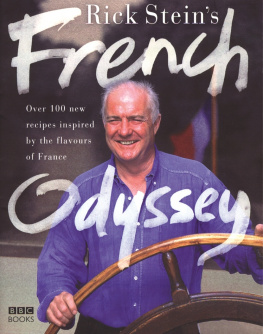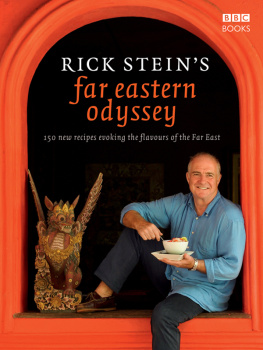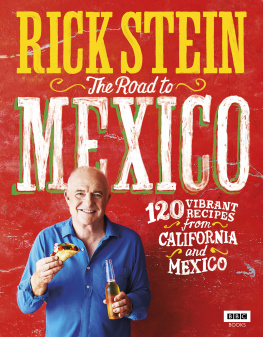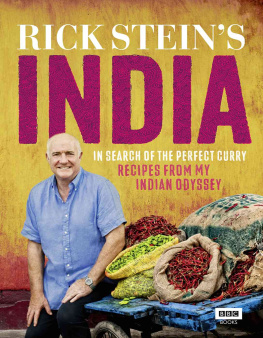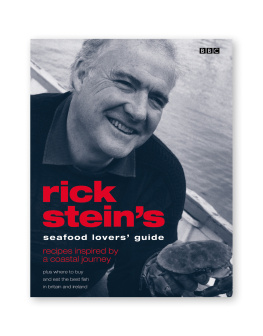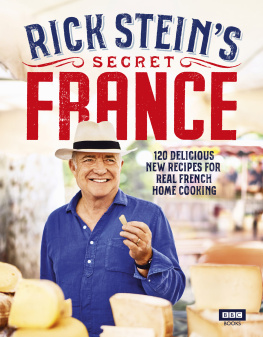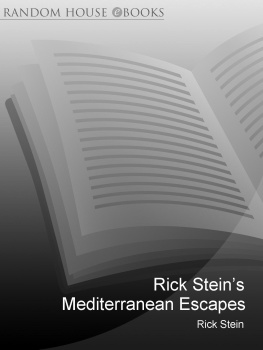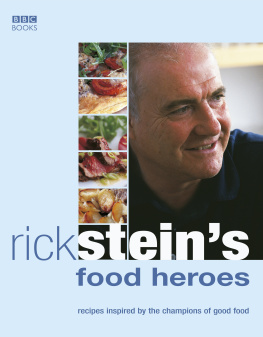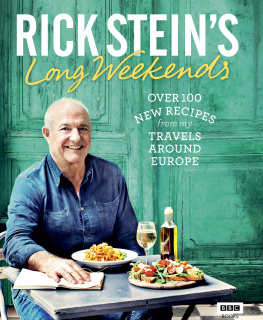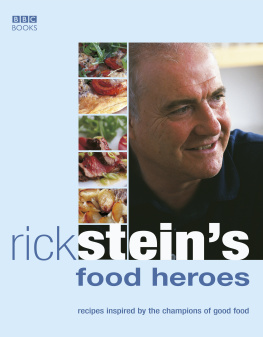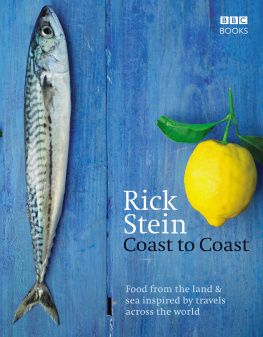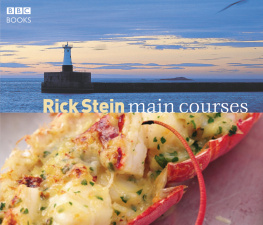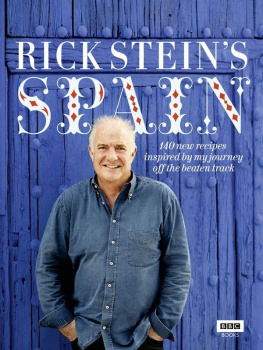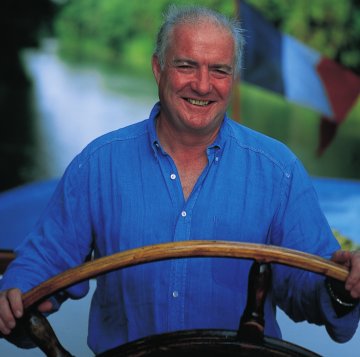Contents
List of Recipes
Rick Steins
French Odyssey
Over 100 New Recipes Inspired by the Flavours of France
Notes on the recipes
All teaspoon and tablespoon measurements are level unless otherwise stated and are based on measuring spoons: 1 teaspoon = 5 ml and 1 tablespoon = 15 ml.
All recipes have been tested in a conventional oven. For a fan oven, reduce the temperature by about 20C. I always test with an oven thermometer before cooking.
Free-range eggs are recommended in all recipes. Recipes with raw or lightly cooked eggs should be avoided by anyone who is pregnant or in a vulnerable health group.
Notes from a journey
It might have been sensible to close the little top window at the front of my cottage in Padstow when I left at 5.30 a.m. on Monday 7 June for the ferry terminal at Plymouth. A week later, on the canal boat from Bordeaux to Marseille, I found out someone had tried to squeeze through it, but had been surprised by one of my restaurant chefs rolling home at 3 a.m. and had run off down the road, followed closely, apparently, by his lurcher dog.
It was overexcitement, Im afraid. I was too busy packing my Michelin guide, well-thumbed copy of Elizabeth Davids French Provincial Cooking, a CD called Learn French Now! and maps of Charente-Maritime, Bordeaux, Gascony, the Languedoc and Provence. I had a little book on the Canal du Midi by a rather pedantic yachtsman who preferred the canal system to get to the Mediterranean rather than sailing round Spain and Portugal. My prized possession, though, was a treasured copy of Caroline Conrans Under the Sun, in which she describes the complete euphoria of leaving 1960s London and driving the plane-tree-lined straight roads all the way to Saint Tropez. As she pointed out, the food from the south is simple to make and relies on a harmony of flavours rather than a lot of decoration or extravagant ingredients. The French call it cuisine de terroir, she wrote, and that was what I was looking for, the sort of food that has made Italy so popular but which I knew I could also find in the French Midi.
I packed a couple of knives, too, hoping to do some cooking on the way, and some Proust, Alexandre Dumas, Montaigne, and DVDs of Jean de Florette and Manon des Sources, foolishly thinking I would have plenty of time on the long voyage south to catch up on relevant reading and watch a couple of atmospheric films of Provenal peasant life.
This was the start of another food journey, a French odyssey. David Pritchard, the producer I work with, and I had decided to make the trip some months before. We had suggested the idea of a voyage of food discovery through southern France to the BBC, who seemed interested but asked for a written outline. On a paper tablecloth in Le Quartier Vert, a restaurant near the BBC in Whiteladies Road, Bristol, David drew a map of southern France. He put in the canal system we were going to travel along: the Canal Latral la Garonne, the Canal du Midi and the Canal du Rhne Marseille. Then he drew pictures of various food areas a rather rudimentary duck here with the comment foie gras country, and a sheep there, brebis cheese from these marsh sheep near Pouillac. Here an Aussie flying winemaker makes great Viognier, down on the Mediterranean tang de Thau oysters growing on stakes, and in another place Rick has posh Sauternes-maker chum. Then he spilt a little red wine on it, borrowed a fag and made a couple of cigarette burns, folded the tablecloth and posted it to the boss at the BBC.
Next day it seemed like a bit of lunchtime euphoria and maybe they wouldnt enjoy our sense of humour, but they did, though they asked for a more conventional treatment as well.
When I picked up that phone message about my house, I was out fishing for shad in the Garonne, some 20 kilometres east of Bordeaux, with fisherman Alain Penichon. We had boarded our first canal boat the day before at Bgles, Bordeaux. Named the Rosa, it was 130 feet long, slept eight and had a crew of three. Boarding the barge, as they are called, was astonishing. I had been used to British canal boats, long and very narrow, where you have to pull your tummy in when anyone passes you. Here was luxurious accommodation: rooms with double beds and bathrooms, and air-conditioning too well, sometimes. The main cabin was spacious with sofas and a big dining table and a small bar, behind which I determinedly hung a painting of Chalky, my Jack Russell. We had hoped to take him with us. He likes being on the water and would have been great at chasing ducks, but sadly we hadnt had him computer-chipped in time, and the vet back home said he was a bit old anyway.
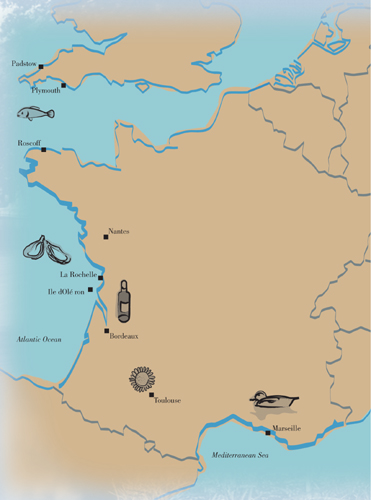
And I was off fishing for legendary shad. We caught a dozen handsome deep-bodied silver fish using a light net cast out into the current. The softness of the light, the weedy smell and the warm brown river were captivating, quite unlike sea fishing. Alain, like all the river fishermen I met, was quiet, relaxed, content to watch the river flow. We were going to take these fish back to Alains house on the banks of the river and cook them over vine prunings. A vine-pruning barbecue in the Bordelaise: of such things are dreams made. It wasnt just the fragrant smoky steaks of fish, but a frying pan filled with sandy pommes sarladaise cooked in goose fat with a persillade of parsley and garlic, and a sauce gribiche of chopped egg yolks, capers, parsley and red wine vinegar the perfect accompaniment. Then, to finish, a tart of sliced caramelized apples. A local Bordeaux red, Domaine de Labache, was a perfect fit. I had to pinch myself, even with that mobile-phone message about my house.
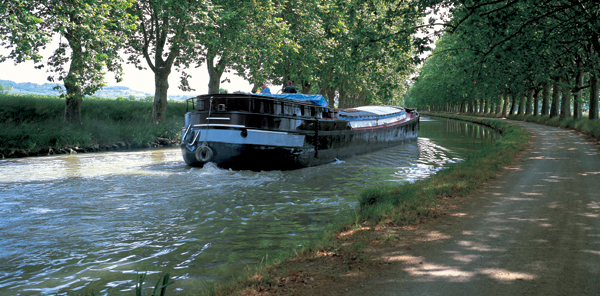
The Canal du Midi near Argeliers between Carcassonne and Bziers
That night we reached the beginning of the Canal Latral la Garonne, which runs beside the river all the way from Bordeaux to Toulouse, built because much of the river is too shallow for barging. I had to become used to the word barging or, more accurately, bargin. The crew of the Rosa, Bernard, Michel and Julie, were French and formal and so much of the secret life of bargin was at that stage unknown to us.
Bernard, we soon learnt, ran a very tight ship, but the extraordinary formality of the meals he cooked and served was one of the most revealing parts of the trip, revealing about the difference between the British and French attitude to food. Julie described a visit to a pen-friend in Grimsby a couple of years previously as being very enjoyable, but extraordinary in that the whole family seemed to be constantly watching TV and eating while they did so. Bernards lunches and dinners were always four courses, always taken at a leisurely pace and always just enough and no more. There is a French saying to the effect that one should always leave the table wanting more. That is why French women dont get fat they take their time about eating. I did a little chat to the DVC camera towards the end of the voyage, an inspired idea of Davids: ten things we like about France. Number one, of course, was the women their style, their elegance in dress at whatever age but number two was the simple fact that everything stops for lunch. Other things were: there are very few signs telling you what to do or not to do, and, surprisingly perhaps, after a month or two there you realize that the French, certainly in the south, are actually nice.

